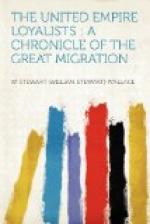In defence of the Loyalists, two considerations may be urged. In the first place, it must be remembered that they were men who had been evicted from their homes, and whose property had been confiscated. They had been placed under the ban of the law: the payment of their debts had been denied them; and they had been forbidden to return to their native land under penalty of death without benefit of clergy. They had been imprisoned, fined, subjected to special taxation; their families had been maltreated, and were in many cases still in the hands of their enemies. They would have been hardly human had they waged a mimic warfare. In the second place, their depredations were of great value from a military point of view. Not only did they prevent thousands of militiamen from joining the Continental army, but they seriously threatened the sources of Washington’s food supply. The valleys which they ravaged were the granary of the revolutionary forces. In 1780 Sir John Johnson destroyed in the Schoharie valley alone no less than eighty thousand bushels of grain; and this loss, as Washington wrote to the president of Congress, ’threatened alarming consequences.’ That this work of destruction was agreeable to the Loyalists cannot be doubted; but this fact does not diminish its value as a military measure.
CHAPTER V
PEACE WITHOUT HONOUR
The war was brought to a virtual termination by the surrender of Cornwallis at Yorktown on October 19, 1781. The definitive articles of peace were signed at Versailles on September 3, 1783. During the two years that intervened between these events, the lot of the Loyalists was one of gloomy uncertainty. They found it hard to believe that the British government would abandon them to the mercy of their enemies; and yet the temper of the revolutionists toward them continued such that there seemed little hope of concession or conciliation. Success had not taught the rebels the grace of forgiveness. At the capitulation of Yorktown, Washington had refused to treat with the Loyalists in Cornwallis’s army on the same terms as with the British regulars; and Cornwallis had been compelled to smuggle his Loyalist levies out of Yorktown on the ship that carried the news of his surrender to New York. As late as 1782 fresh confiscation laws had been passed in Georgia and the Carolinas; and in New York a law had been passed cancelling all debts due to Loyalists, on condition that one-fortieth of the debt was paid into the state treasury. These were straws which showed the way the wind was blowing.




